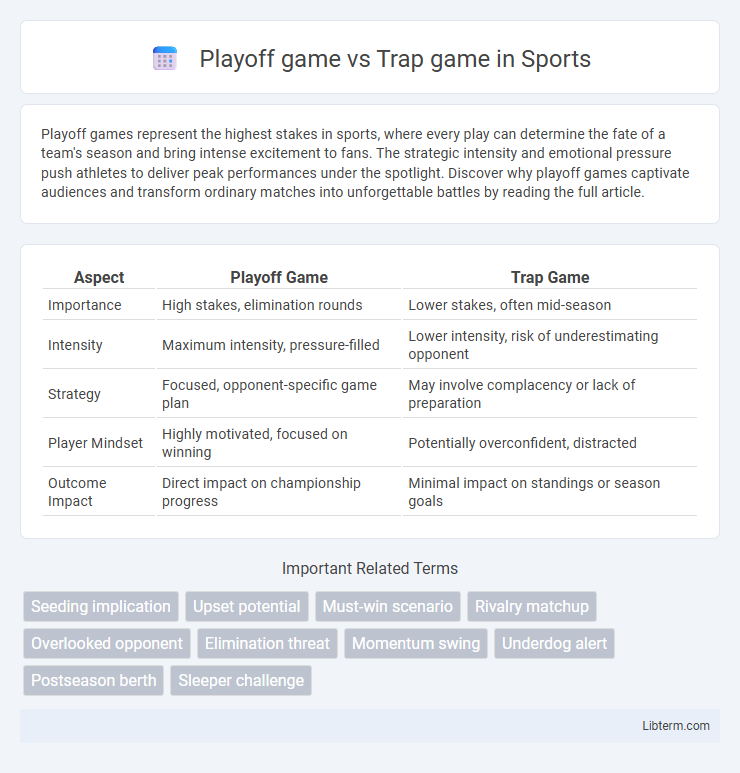Playoff games represent the highest stakes in sports, where every play can determine the fate of a team's season and bring intense excitement to fans. The strategic intensity and emotional pressure push athletes to deliver peak performances under the spotlight. Discover why playoff games captivate audiences and transform ordinary matches into unforgettable battles by reading the full article.
Table of Comparison
| Aspect | Playoff Game | Trap Game |
|---|---|---|
| Importance | High stakes, elimination rounds | Lower stakes, often mid-season |
| Intensity | Maximum intensity, pressure-filled | Lower intensity, risk of underestimating opponent |
| Strategy | Focused, opponent-specific game plan | May involve complacency or lack of preparation |
| Player Mindset | Highly motivated, focused on winning | Potentially overconfident, distracted |
| Outcome Impact | Direct impact on championship progress | Minimal impact on standings or season goals |
Understanding Playoff Games: High Stakes and Intensity
Playoff games elevate competitive intensity by introducing elimination stakes where teams must win to advance or claim championships, intensifying player focus and strategic execution. These games often feature heightened physicality and mental pressure, as the outcomes directly impact a team's season success and legacy. Understanding the high stakes of playoff games helps explain the increased urgency, aggressive tactics, and emotional performances distinctive from regular-season or trap games.
What Defines a Trap Game in Sports?
A trap game in sports is defined by a matchup where a favored team faces an ostensibly weaker opponent, often leading to unexpected challenges and potential upsets. Characteristics include underdog teams playing with heightened motivation, less pressure on their side, and the favored team possibly underestimating the opponent. This dynamic creates a psychological and strategic hurdle that can derail playoff momentum if the favored team is not fully prepared.
Key Differences Between Playoff and Trap Games
Playoff games prioritize high-stakes competition with elimination rounds, emphasizing peak performance under pressure and strategic depth for advancing in tournaments. Trap games, often viewed as potential upsets, require teams to maintain focus and avoid underestimating weaker opponents, highlighting consistency and mental toughness. The key difference lies in the intensity and consequences of playoff games compared to the vigilance needed in trap games to prevent unexpected losses.
Psychological Pressure: Playoff vs. Trap Game Scenarios
Playoff games amplify psychological pressure due to high stakes and intense scrutiny, often impacting player focus and decision-making under stress. Trap games, despite lower external expectations, create internal pressure as teams risk complacency and overconfidence, leading to unexpected errors. Understanding these mental dynamics is crucial for coaches to prepare athletes to maintain performance consistency across both scenarios.
Impact on Team Preparation and Strategy
Playoff games demand heightened intensity and precision in team preparation, emphasizing detailed analysis of opponent tendencies and adaptability under pressure. The stakes increase, requiring coaches to implement flexible strategies that can quickly adjust to the evolving dynamics of the game. In contrast, trap games, often perceived as underestimated matchups, challenge teams to maintain focus and execution against potentially unexpected tactics, necessitating thorough scouting and mental readiness to avoid costly mistakes.
Examples of Notorious Trap Games in Sports History
Notorious trap games in sports history often involve favored teams underestimating underdogs, resulting in shocking upsets such as the 2007 Fiesta Bowl where Boise State defeated Oklahoma or the 2018 NFL Week 1 where the defending champions Philadelphia Eagles lost to the Atlanta Falcons. Another iconic example includes the 2010 NBA Playoff game when the Cleveland Cavaliers, heavily favored, fell to the Boston Celtics in a sudden defeat that highlighted the dangers of complacency. These games underscore the psychological pitfalls leading to unexpected outcomes despite apparent advantages.
Playoff Performance: Rising to the Occasion
Playoff games demand heightened focus, resilience, and strategic execution as teams face intensified competition and increased pressure. Performance in these high-stakes moments often defines a player's legacy, showcasing their ability to elevate their skills under intense scrutiny. Rising to the occasion in playoff scenarios requires mental toughness and clutch performance, differentiating elite competitors from regular-season participants.
Common Pitfalls: Teams Falling Victim to Trap Games
Teams often underestimate trap games by overlooking opponents with inferior records, leading to lackluster performances and unexpected upsets. Overconfidence and insufficient preparation make playoff contenders vulnerable to strategic traps designed to exploit their weaknesses. Recognizing trap scenarios and maintaining consistent focus are crucial to avoid these common pitfalls and secure victory.
Coaching Tactics: Preparing for Playoff vs. Trap Games
Coaching tactics for playoff games emphasize strategic adaptability and mental fortitude to navigate high-pressure environments and opponent unpredictability. In contrast, preparing for trap games requires heightened focus on preventing complacency and exploiting an opponent's overconfidence through disciplined game plans and situational awareness. Coaches leverage detailed video analysis and scenario-based drills to tailor preparation specific to the unique challenges posed by playoff intensity versus the unexpected adversity of trap matchups.
Lessons for Athletes: Avoiding Complacency in Every Game
Playoff games demand heightened focus and intensity, teaching athletes that every match requires maximum effort regardless of stakes. Trap games present the risk of complacency when facing perceived weaker opponents, highlighting the necessity of consistent preparation and mental readiness. Learning to maintain competitive drive in all situations fosters resilience and prevents costly lapses that can derail season goals.
Playoff game Infographic

 libterm.com
libterm.com